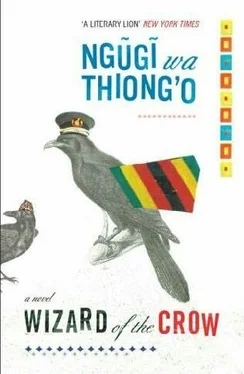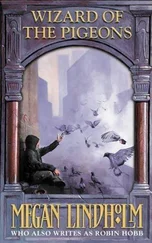“Well, I could not help laughing at the minister’s words and worries.
“The Wizard of the Crow is a modern sorcerer,’ I told him. He dresses in suits. Besides, he uses only a mirror for his divinations.’
“True! Haki ya Mungu! Minister Machokali’s jaw fell and his eyes almost popped out at my description of the Wizard of the Crow and his divine mirror.”
Machokali did not much believe in witchcraft and divination. But a bird exhausted in flight lands on the nearest anything, and for him the Wizard of the Crow was now that anything. If the Buler’s health was to improve, it would not matter what he, Machokali, believed or did not. What now most preoccupied him were the measures to take to prevent news of the sorcerer’s presence from leaking beyond the inner council of ministers and the security officers. As Minister for Foreign Affairs, Machokali was responsible for projecting a favorable image of his country, and he would not now want to make the Buler and Aburlria laughing stocks in the eyes of the world, particularly in the corridors of the United Nations. He could imagine the snickering that would greet him wherever he went: How are your Buler and his sorcerer getting along?
Machokali was relieved at the airport when he saw the Wizard of the Crow in a dark suit, a briefcase in hand, looking every inch a businessman like any other in New York.
They did not speak much on the way to the hotel, where Machokali whisked him straight up to the Buler’s floors without registering the newly arrived guest. There was to be no record of the sorcerer’s visit.
“Do you need anything?” Machokali asked him as soon as he had been shown his room. “Take a bath, change, and then let’s go to the Buler. Or how about a bite of something first?”
Instead of answering, the Wizard of the Crow looked now at the minister, and then at A.C., as if puzzled as to who was whom.
“Is either of you in a position to tell me what the Buler wants to see me about?”
“Excuse me, my sirs,” said A.G. in Kiswahili quickly, sensing the tension, somehow trying to address them both as equals. “We did not do what the English call an introduction, or, in Kiswahili, making people know one another. This here is the Minister for Foreign Affairs, Mr. and Dr. Machokali.”
The words, my sirs, irritated Machokali, and he cast a fierce glance at A.G., as if to warn him that he, the minister, was the only sir here.
“Didn’t Minister Sikiokuu tell you what this is about?” Machokali asked.
“Only that the Ruler had sent for me.”
Machokali did not go into details about the Ruler’s illness but told the wizard that he was to use all the powers he was reputed to possess to heal the chief. He was to return to Aburlria the following morning. It was that simple.
“I am a little jet-lagged,” the Wizard of the Crow told Machokali firmly. “Let me get some rest so that my head can work clearly.”
Jet-lagged? What would a sorcerer know about jet lag? Machokali did not voice his curiosity but stressed the need for speed.
A.G. again sensed tension between the two sirs, and he hastened to whisper in Machokali’s ear. Let’s do what he wants. We don’t want to make him angry.
Machokali was not happy with the sorcerer’s attitude. He was equally unhappy with A.G.’s fear and humility. Yet he felt he had no choice but to accede to the sorcerer’s request. In the event of the sorcerer’s failure, he did not want it said that he was somehow responsible.
“Let us meet tomorrow, then,” Machokali said.
That very evening, Machokali called all the ministers to his room. Dr. Luminous Karamu-Mbu, the official biographer, or TOB, as he was known sometimes, wanted to attend but he was barred because he was not a member of the cabinet. A special exception had been made for Dr. Wilfred Kaboca and the security men only because of their expertise in matters under review.
Karamu-Mbu was not the most popular of fellows. He was a man of few words and even fewer friends. The size of his pen was intimidating, and nobody was quite sure what it was that he wrote in the equally huge notebook. Everybody was a little scared of his nearness to the throne and avoided him as much as possible. Normally TOB was too busy recording the tiniest details of the Ruler’s existence to miss company. But since the Ruler had fallen ill, TOB had written the same thing over and over. Today the Ruler remained ill and speechless. Today the Ruler remained bedridden and speechless. Today ditto. TOB did not know what to do with all the time on his hands, so his exclusion from the meeting was especially disconcerting. He retired to his room to arrange in proper and readable order the notes he had taken since the delegation arrived in America.
Machokali did not know quite how to break his news but decided that plunging into the matter was the best policy. Still, he wanted to go about it gingerly so as not to offend the ministers’ egos. He began not with the sorcerer’s arrival but with a brief account of how it came to be that this sorcerer was in New York and how the Ruler himself had nodded in agreement. He stopped to assess the impact of his words. There was no snickering, to Machokali’s surprise; a few even admitted that they had heard of the Wizard of the Crow, had been thinking along the same lines, and had kept their views to themselves only because they had wanted to give science a chance. Even Dr. Wilfred Kaboca did not express any doubts.
“So when will he come to New York?” they all wanted to know.
Machokali broke the news. They looked at one another, stupefied. But soon they recovered from the shock and curiosity took over. What did he look like? Was he young or old? How was he dressed? They agreed, after much discussion, that they should not show too much eagerness to meet the wizard, that they should simply cast quick glances in his direction in order not to give him the notion that he was in the same ranks with ministers. They also resolved not to tell the wizard about the white doctors and not to tell Drs. Furyk and Clarkwell about the wizard. Were the Ruler’s health to improve, what did it matter if Harvard science took the credit?
Early the next day Machokali called on the Wizard of the Crow. The sorcerer, who was fiddling with his tie in front of a mirror, gestured to Machokali to sit and continued fumbling. But the minister just stood and looked on.
“You slept well?” Machokali began in an attempt at small talk.
The more Machokali encountered the Wizard of the Crow, the more he had his doubts. How did such a youth become so adept at healing?
“I am told that you diagnose and heal by means of a mirror?”
“It depends on the illness and the mirror. Mirrors can be thick or thin, convex or concave: every illness calls for a mirror appropriate to the challenge it poses. It takes time for me to interpret the images in the mirror. I must also speak to everyone who has had any contact with a patient. You and all the ministers, for example…”
What if Sikiokuu had hired this man to implicate Machokali or the other ministers in a conspiracy to harm the Ruler?
“You know, don’t you, that this matter should not spread beyond these walls? That it should be confined to the small circle of those who are here?”
“Mr. Minister, my motto is Get It by the Roots, and the Illness Shall Be No More. If I am to root the illness out, I must talk to whomever I deem necessary.”
“Okay You may see all the ministers, the security men, and his doctor.”
“How many doctors does he have?”
“Just one. Dr. Wilfred Kaboca. His personal physician. He never leaves his side.”
Читать дальше












